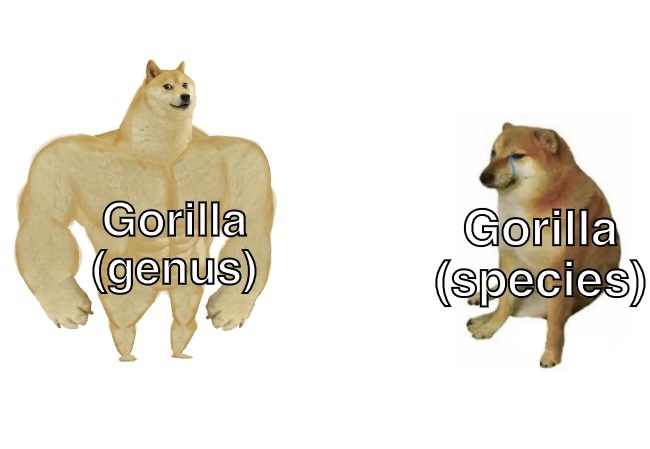Pluto will always be a planet to me, and you’ll pry that definition from my cold, dead hands!
Arenyou gonna start calling Ceres, Haumea, Makemake, and Orcus planets?
We went through this 150 years ago ehen the asteroid belt was discovered. Every astronomer wanted credit for discovering a new planet, so at one point there were 15 before all the astronomers got together and said it was untenable.
Yes. We could have had a planet Orcus and we were like “nah, we’ll pass.” That would have been metal as shit.
without orbital dominance?
amazon.com ass planet with fake reviews.
Yeah but it’s delivered with a nice hand written note from a single mom in China so I 5 star anyways.
The central point that Pluto and Charon orbit about is also outside of Pluto. All other planets have the center point located within the planet.
https://en.wikipedia.org/wiki/File:Pluto-Charon_system-new.gif
Then that makes it the solar system’s first discovered Binary planets
Real scientific, Jerry.
Whatever, Pluto is a dwarf planet like every other dwarf planet too.
New Billy Joel song? I heard he’s writing again.
You know, this post made me realize something. Some people are viewing it in terms of “rank”, instead of an arbitrary scientific classification designed to efficiently communicate ideas in a clear and concise way.
It’s like … mythology or something, and the planet(oid) being anthropomorphized.
Do people also view kingdom, phylum, class, order, family, genus, species as “ranks” of some sort, with some intrinsically greater value being given to some over others?
It’s like … mythology or something, and the planet(oid) being anthropomorphized.
I mean, the planet(oid)s are named after gods.
The personification of its classification is probably related to the exclusivity of the title and “bigger is better” mentality. Since every life form has a taxonomy for domain to species, there’s not really an exclusivity to each echelon. I don’t imagine anybody really thinks like this meme below, for example:

This makes me want to devise a tiered, inclusive classification scheme for space objects.
We could start with orbital objects, any object that normally experiences regular, periodic orbits with minimal deviation. So, everything in the galaxy would be one except potentially Sag A, and the galaxy itself. Perhaps the next branching subsets could be things undergoing continuous fusion somewhere in their body or not?
Do people also view kingdom, phylum, class, order, family, genus, species as “ranks” of some sort, with some intrinsically greater value being given to some over others?
Well, for humans we most certainly do
So, “homo” is better than “sapiens”? And “animal” is better than homo sapiens?
Or do I have it backwards, and “lower” ranks are better? So, “pinus ponderosa” would be better than “plant”?
I was just alluding to our racism 👀
Our racism is completely unrelated to our classification. We are racist between homo sapiens and homo sapiens
Hard not to anthropomorphize things when they’re named after our gods
Thing is everyone has one of those.
Compare it to non-sentience, sentience, and sapience, to properly anthropomorphize it.
Every celestial body fits into a specific classification too.
Yeah but no one just has a kingdom or phylum.
Every living creature gets an entry from domain to species.
Celestial bodies aren’t a hierarchy, a planet isn’t also a dwarf planet or an asteroid.
I think it’ll matter a bit more once (if) we get to explore our solar system for real. I feel like right now the concept of “planet” is still rather distant in our minds and a lot of people just base it on vibes
Planet Y
In case it’s a dwarf
Planet x
Damnit who let Elon name that planet?
When ever Eris isn’t on screen everyone should be asking “Where’s Eris?”
“Where is Eris? Is it safe? Is it all right?”
“It appears that, in your anger… You classified it as a dwarf planet.”
“NOOOOOOOOOOOOOOOO!”
Hmmm… Lost a planet Obi-Wan has. How embarrassing.
Note: Eris died on the way back to his home minor planet.
The planet formerly known as twitter.
Alright, if I ever talk about this planet this is what I’m calling it from now on.
Is planet X really discovered?
They found more evidence for its existence recently, but no. Nobody has ever seen it or even found out in which direction to look. The evidence is that the other planets move in ways that only makes sense if there is some mass somewhere pulling their orbits.
Sort of like having to discover the moon from watching the tides in the sea.
this method is how we discovered Neptune and Pluto and many exoplanets. Kepler’s laws are extremely specific about orbits, so once you pin down the disturbances the planet makes you significantly narrow down the places it can be.
Yes, but that new evidence is way less distinguishable from noise than the one for Neptune.
At this point, the most likely is that there isn’t anything there.
Can we just send someone to check it out? Stop being lazy.
I have a pizza for I. C. Weiner
Yes, the difference being that the existence of Neptune and Pluto could be visually confirmed through telescope more easily. They’re also not visible to the naked eye, but they can be found in telescopic images by comparing to a map of the sky at other times. Later on they were visited by probes.
I don’t know what counts as a discovery of a planet. Personally, I’d like to see any kind of real data from the planet before claiming it discovered.
The calculations can be 100% correct, but they’re not verified until there’s some kind of external proof.
The planet X (or 9 or whatever) has yet to be seen in any kind of way.
So far the calculations have been confirmed by other calculations showing the same thing, and they’re most certainly correct, but the “solid” proof is still missing.
(It doesn’t have to be solid or visual, I don’t know the English word for it; it just needs to originate from the actual existence of the planet and not only from the effects of its theoretical existence.)
Thought there were some significant progress…
Well we figured out where to look for it, and it is definitely the sky. We tried looking the last place we left it, and then we looked all around the basement from top to bottom. Yup, we can say with confidence folks, Planet X is hiding somewhere above us.
Yeah well, not really. Next year maybe, according to the article linked yesterday.
Have they tried looking up towards the sky? I think they won’t find it underground.
Finally, all that yoyo polish!
I believe there was a mathematical constant to find the space ( km/ lightyaers from the sun ) where a planet should be. Do’nt remember the name tho. Is pluto on the next ‘free space’ ?







